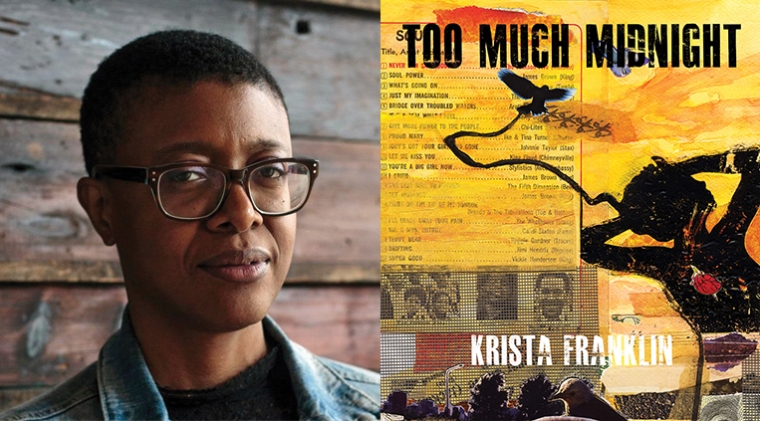This week’s installment of Ten Questions features Krista Franklin, whose new hybrid work of poems and visual art, Too Much Midnight, is out today from Haymarket Books. The collection is the latest title in the BreakBeat Poet Series, which celebrates “work that brings the aesthetic of hip-hop practice to the page.” In the pages of Too Much Midnight, Franklin builds upon and explodes the parameters of this aesthetic in order to excavate the intersection of poetics, popular culture, and the African Diaspora. She shifts effortlessly between historical vignettes and nods to modern figures such as Toni Morrison and Lil’ Kim; she obscures and reveals newspaper clippings and other found text with paint and cut photographs; she writes in prose poems, then tight stanzas. In troubling every possible boundary, those that others might not even think to disturb, Franklin cultivates and demonstrates the possibility of creative liberation. “Too Much Midnight is a refreshing and all-consuming text,” writes Hanif Abdurraqib. “This is work of uplift, of persistence, of dreams for a new horizon and a better world beyond it.” Krista Franklin is also the author of the chapbook, Study of Love & Black Body (Willow Books, 2012), and the hybrid work, Under the Knife (Candor Arts, 2018). Her visual art has been exhibited nationally and her writing has appeared in BOMB, Callaloo, and Poetry, among other outlets. Born in Dayton, she lives and works in Chicago.

Krista Franklin, author of Too Much Midnight.
1. How long did it take you to write Too Much Midnight?
The writing and art that appears in Too Much Midnight was created in an eighteen-year time span. It took a little over twenty years to accumulate the work, piece it together—with a lot of direction from my editors at Haymarket, Maya Marshall and Kevin Coval—and publish it.
2. What was the most challenging thing about writing the book?
I didn’t set out to write Too Much Midnight—it’s a book that formed over time. I’m certain there were thousands of challenges along the way, but the biggest challenge for me to accomplish any project is working to keep myself out of the way. I’m a master procrastinator.
3. Where, when, and how often do you write?
Mostly I write where I live. Occasionally I write in museums or art spaces. “When” is a fantastic question. At this point in my life I write very sporadically. My visual art practice takes up a lot of physical, mental, and emotional real estate, so the writing happens in bursts, or when someone commissions me to write. The most writing I tend to do these days is presentation essays about my art practice, which generates a great deal of anxiety for me.
4. What are you reading right now?
I just finished You by Caroline Kepnes. Now I’m reading A Billion Black Anthropocenes or None by Kathryn Yusoff.
5. Which author, in your opinion, deserves wider recognition?
Metta Sáma.
6. What is the biggest impediment to your writing life?
Visual art, maybe, but since some of my writing is fueled by visual art—by others as well as my own—that may not be accurate.
7. What trait do you most value in an editor (or agent)?
An extraordinary amount of patience. There’s a lot of emotionally-driven histrionics on my part, so any editor or curator who works with me has to be patient, thick-skinned, and adaptable.
8. If you could go back in time and talk to the earlier you, before you started Too Much Midnight, what would you say?
I probably wouldn’t say anything to an earlier me. I think I’d be too preoccupied with listening to what earlier me had to say. I tend to get hypnotized by the past, so I would more than likely interview my earlier self in search of who-knows-what.
9. Who is your most trusted reader of your work and why?
I am. My writing hinges mostly on sound and rhythm, and I’m the only person who intimately knows the sonics of those compositions. I revere and deeply respect outside readers and viewers of my work, but I trust my gut the most.
10. What’s the best piece of writing advice you’ve ever heard?
To just write, to practice the act of writing daily in order to keep the pump primed. If it’s already ritual then the writing will flow naturally when you have to write. Now, if I could just follow that advice.








